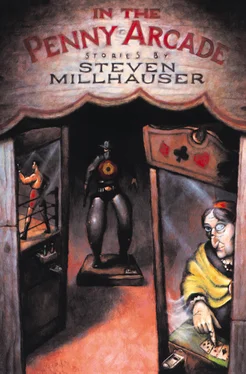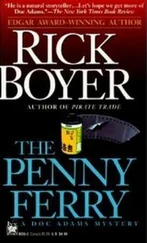“Why did you do it?” His own voice sounded weary to him; he must sleep.
“Sheer love of the art, of course, and then there’s the little matter of”—he rubbed two fingers briskly against the thumb—“filthy lucre. Our Zaubertheater has fallen on evil days. When you refused to do homage to the noble buttock”—he shrugged. “After all, I know them better than you do. But don’t look so downcast. The proceeds are what keep you afloat.”
“Not any more. I’m through.”
“I was afraid you might take it badly. That’s why, when you failed to recognize my work — and I did bring you there myself, pray remember — I hesitated to insist. Listen, don’t be a fool. Tainted money, eh? A bit too literary: Pip and Magwitch. Where else will you get a chance like this? I have news for you, my gifted but oh so innocent friend: automatons are dead. A handful care — they’re not enough. Oh, who knows, perhaps if we held on for twenty years, for thirty years…even so, you are about to become outmoded. L’image animée is the wave of the future: I’ve explained it to you before. My friend, you are a brilliant poet writing a late-nineteenth-century poem in Middle High German: three scholars, one with a hearing difficulty, one with an unfortunate tic douloureux , and one requiring a bedpan, compose your audience.”
“I express what I have to in a particular medium. What else is art? I don’t study fads and trends.”
“But I do, and I tell you, my friend: the day of the automaton is over.”
“As I conceive it, the day has never even begun. But this is a useless discussion.”
“And therefore quite artistic, at least according to one of the century’s more charming notions — though I’m afraid the boyfriend of Beatrice might have disagreed. Who cares where the money comes from? Turn the sow’s purse into a silk ear.”
“It’s not that, exactly. You should have told me. You’re playing some kind of game….”
“I’m a playful fellow — it’s my artistic nature. Look, I know them: they’re swine. I supply them with troughs. It amuses me; many things do. I like to see them prating about Liebe and Schönheit — and coming to the trough in the end. Did you notice, my inattentive friend, how many of the faces are familiar? They start out at the Zaubertheater and end up at the Schwarzen Stiefel: yes, it pleases me to make certain experiments, I won’t deny it. Let me tell you something. When I was a lad of sixteen I went about with a blue-eyed maiden from a cultured family. Or to be more precise: the father was the owner of a pork butcher shop and the mother read Kleist and Nietzsche and Baudelaire and played Liszt and Wagner on the pianoforte. She took an interest in me, lent me books, and was in every way so superior to her empty-headed daughter that I soon dropped every pretense of caring about the girl and looked forward only to my next dose of spiritual food from the lips of the mother. I wasn’t by any means unaware of the more material charms of my maternal Beatrice, but I no more thought of violating that shrine than I thought of attempting to discuss the Übermensch with her daughter. Need I say more? One twilit afternoon, as I turned the pages of a Chopin nocturne while she played, she seemed to grow faint as she neared the end of the piece, and as the last chords died away I was astonished to feel her head against my shoulder. Like a nice young idiot I asked her if she wanted a glass of water. She asked me to lead her to the couch. She was very direct. One detail I remember quite vividly: at the moment all youth dreams of — I had never been with a woman before, and had to be shown how to make her wet — but at that famous moment I saw, not far beyond her tense, flushed face, which appeared to be the strangely distorted mask of the woman whose soul I adored — I saw, lying upon a little mahogany table, a copy of volume two of Dichtung und Wahrheit , from which she had earlier read me a passage in order to compare it unfavorably to the nervous prose of Kleist. It was then I realized that art is nothing but a beautiful cool hand placed by a woman, sometimes not very carefully, over her hot pudendum. She spoke to me of beauty and the soul, but she really meant to speak of less rarefied matters. During her orgasms, which she herself compared to the Liebestod, she was fond of sighing out “Beautiful…oh, beautiful…”—a chant varied by the frequent interpolation of choice obscenities. Our meetings grew less and less artistic until one day — but that, my friend, is a story I shall save for my memoirs. I still have a dread of pork butchers. And so at the tender age of sixteen I learned an important secret: all words are masks, and the lovelier they are, the more they are meant to conceal. If it pleases me to be an unmasker — why, all to the good, I serve the fatherland in my own generous way. They chatter about the soul, I give them what they really want, and in the process I satisfy a sense of world-irony and a love of truth. Yes, I drag them down, the swine — I drag them down.”
“But that makes you one of the Unter—”
“Yes?” said Hausenstein sharply, but August had caught himself, though not in time. The half-spoken word seemed to float in the space between them, preventing speech. Hausenstein slapped angrily at a fly on his sleeve. After a while he said, “Well. You’ll stay?” August looked up in amazement.
“So you’re going, eh? Splendid. And what will you do? Spend the rest of your life tightening springs in a clockshop? With me you could — oh, to hell with it. It’s been an instructive evening, I always enjoy talking to a genuine artist, however passé.”
August felt a burst of pity for Hausenstein, and hoped he would say no more.
“And let me tell you something, Eschenburg: you aren’t that pure. You think you’re the purest soul on earth, but you knew the theater was started with the money I made from Preisendanz. Who cares if it continues courtesy of the Black Boot?”
Wearily August answered, “I don’t think I’m pure.”
“Just too pure for me, is that it? Too pure to dirty your hands with my filthy money? And I’ll tell you something else: you’re not much of a friend. The minute something happens that doesn’t suit your taste, it’s good-bye friendship. I can’t trust you. There’s something cold about you….” He stood up. “You just sit there….” August looked up wearily and saw Hausenstein staring down at him with glowing bitter eyes. Had he hurt him that much? August felt bone-weary and he seemed to have a headache in the center of each eye. Hausenstein turned suddenly and walked with rapid sharp steps along the stage and down the wooden stairs at the side. He appeared to be leaving brusquely, but suddenly he sat down in the aisle seat, eight seats away from August.
“It’s been a long night. You have a difficult temperament, August. I too upon occasion have been known to be less than charming. Look, we’ve been together a long time. No one knows your work the way I do. No one.” He paused. “You look tired. Get a good night’s sleep. I’ll see you in the morning.” There was a pause, and he stood up violently. “Where will you ever find a friend like me?” Turning on his heel, he strode down the aisle. August heard his steps in the corridor and the sound of the outer door closing.
For a long while he sat there, trying to change his mind. He knew Hausenstein cared about him, and he asked himself whether he was being a bad friend. But he felt he could no longer trust Hausenstein. It was as if some boundary had been crossed, after which trust became impossible. Those naked automatons were a parody of everything he believed in. Hausenstein couldn’t understand, because he believed in nothing. But that wasn’t so: he believed in August. Or did he? Did he want him to fail? Did he take some secret delight in undermining the Zaubertheater? Did he want to drag him down into that trough of his, whose true vice was not its filthiness but its coziness, its air of conspiratorial chumminess, its secret banality masquerading as boldness? These were not the questions you asked of a man you called a friend. And yet, aside from Hausenstein, August had no friend. He was alone, August felt a deep pity for himself, for Hausenstein, for the Zaubertheater, for the universe. Suddenly he remembered that something was bothering him, something Hausenstein had said. What was it? Yes: that he would see him in the morning.
Читать дальше












